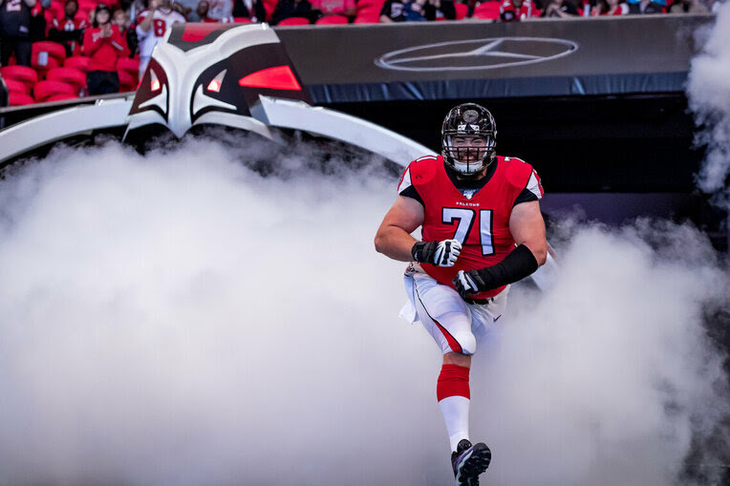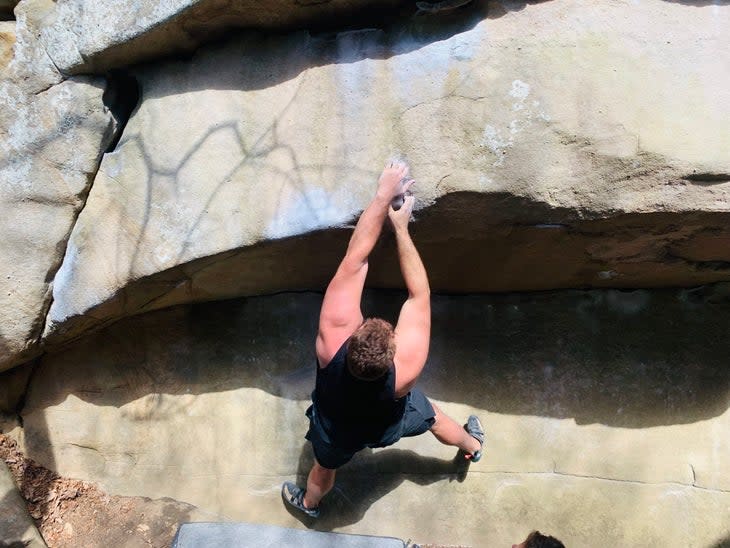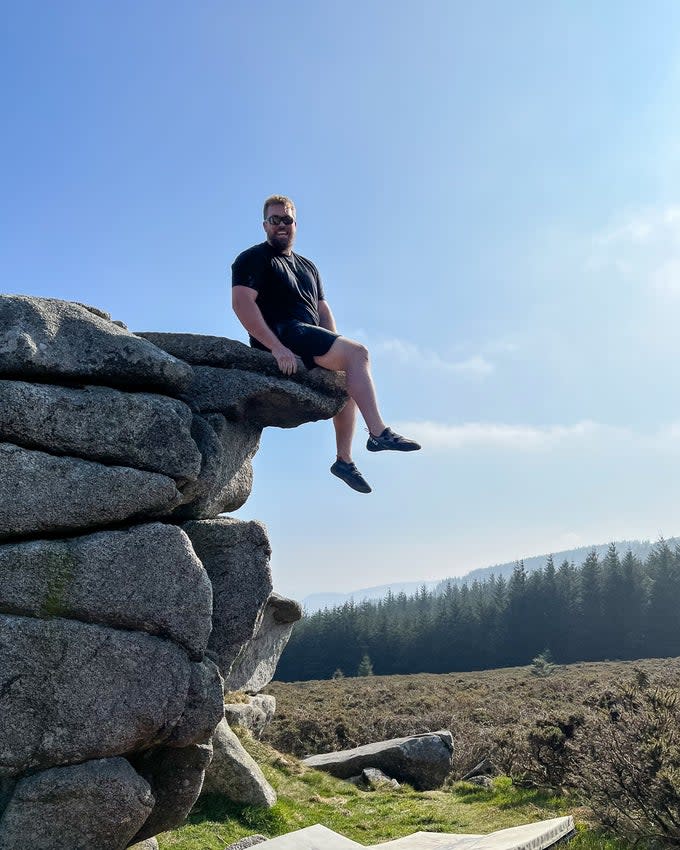Meet the 330-pound NFL Lineman Addicted to Rock Climbing
Climbing
At 6'4" and 330 pounds, Wes Schweitzer is built like a boulder. It's not the body type of a stereotypical rock climber, but his refrigerator-esque physique isn't exactly surprising, either. That's because the 28-year-old plays on the offensive line for the Washington Commanders, and is going into his seventh season in the NFL.
Schweitzer trained traditionally for most of his football career, which began in high school in Arizona and continued on to college at San Jose State, then to the NFL, first with the Atlanta Falcons for four years, and now with the Commanders. "You know, I was running, doing deadlifts, bench press, squats, Olympic lifts, that sort of thing," he said.

But during his second year in the pros, Schweitzer began experiencing severe pain, particularly in his elbows. "I just felt super weak on the field," he said. So his trainer suggested training with climbing holds, instead of traditional barbells."With normal training you only grip barbells, but the hand is built to do all sorts of things," he said. "It's built to hold crimps, slopers, side pulls, pockets, all of that. Climbing holds are much more natural and varied grips." Schweitzer began a variety of climbing-based training sessions, including attaching climbing holds to weights and performing bodyweight exercises on a climbing wall.
"After just one session using these climbing holds, I felt instantly better," Schweitzer said. "I went from feeling weak and in pain to feeling 100 percent again. The climbing hold[s] gave a different stimulus to my arm." His hyperextended elbows, which had given him incessant trouble on the field, were back to normal.
For a while climbing holds were just a part of his conditioning, but two years ago he decided to check out a rock-climbing gym to see what else the sport could offer him. He was shocked: "I was one of the strongest lifters on my entire football team," he said. "I mean, I could deadlift almost 800 pounds, but I couldn't even do a V0. I could barely hang on the wall. I was thinking to myself, if I'm an athlete, I should be able to climb this.... It looked like a ladder.
"That experience showed me that there was so much more to what I thought strength and mobility was."

At first glance, it might seem like training for rock climbing and training for football, particularly as a lineman, would be contrary efforts. But Schweitzer believes there's an immense amount of crossover between the sports.
"People have a weird mindset that if they lift more weight they'll be a better football player," he said. "But I barely do any upper body weightlifting at all anymore. I just climb and do gymnastic-style training, and whenever I do come back to weightlifting, I still bench more than anyone on the team."
Some of his teammates have come climbing with him, but no one else has adopted the same regular climbing Schweitzer does (he goes climbing once a week during the on-season and twice a week off-season). "It's too out of the box," he said. "I think other players think climbing is risky, but I'm just gonna keep letting my performance prove how impactful it can be."
One of the biggest things climbing has given him, however, isn't strength or mobility, but situational awareness. "When you climb, you have to place your foot in a certain spot," he said. "You have to grip the holds in a certain way. You need to produce force in football in a similar way. I'm getting a unique stimulus from climbing that I wouldn't get from normal weightlifting. I'm forced to stand on my toes, drop-knee.... The movements and body positions from climbing are unique, and they're always varied."
Schweitzer also likened grabbing the shoulder pads of the player across from him on the line to grabbing climbing holds. "During gameplay, my main goal is to grab someone and physically stop them," he said. "And for those two or three seconds, I'm making hand contact, grabbing their shoulder pads. The front of the pad over the pec is basically like a big jug that I have to grab on the fly," he said, laughing. "It's pretty similar."

It's been two years since Schweitzer started climbing. He mostly boulders and topropes, up to V4 and 5.10a outside, and has started leading sport routes, too. "[Climbing] completely changed my game on the field, and I feel much healthier," he said. "I've also just found a major passion for it. This is what I want to do for the rest of my life. I'm a climber that just happened to play football."
One obvious point of differentiation between football and climbing is weight. There's no doubt about it, Schweitzer says, he plays better on the field when he's heavier, and his build naturally makes climbing more difficult. Unlike some climbers, however, Schweitzer actually put on weight when he started climbing. "When I started climbing I was 315 pounds. I gained 15 pounds of muscle because that's how much strength it takes to keep my bodyweight on the wall."
While Schweitzer isn't the only heavy climber in the climbing spotlight, the narrative is often that the best body type for climbing is still light, lean, and rail-thin with a long reach. Schweitzer doesn't necessarily believe that. He plans to only drop down to 250 pounds, at the most, after retiring (at which point he plans to climb full time). "People are always trying to be so skinny in climbing, and I don't think they need to be," he said. "Sometimes, they might benefit from a little more weight, a little more muscle. That might help people do some harder moves." Sending 5.13 at 330 pounds is nigh-impossible, Schweitzer noted, or at least significantly more difficult than climbing that grade at a lower weight, but "I think I could set some really cool benchmarks as a heavier guy," he said.
He uses an Edelrid Ohm to manage the large weight difference between himself and his belayer when lead climbing, but bouldering is a bit more difficult. Falling off a boulder at 330 pounds can be sketchy. Schweitzer manages by picking problems with either a flat landing or a low crux.
So far, however, he hasn't had any issues. "One thing I've noticed in climbing is that nobody knows how to fall and land in a squat," he said. "Climbers often fall and land sloppy. In football you have to do all these box jumps, you have to be in a squat often. If climbers did a bit more of that cross-training, they might have fewer injuries hopping off boulders," he said. "I've had no problems jumping down from boulders, even high ones."

Though he's psyched on climbing, Schweitzer was clear that he doesn't put one sport above the other. "I've had a long football career, and I'm really happy both in the NFL and with my team. I want to keep playing football for as long as I can. But I also love climbing. And climbing, unlike football, is a sport you can do for the rest of your life. So I'm full-on climbing. I'm buying training books, I'm planning my trips outside, I'm just loving it."
Schweitzer doesn't just enjoy climbing the routes and styles that come easy to him, however, nor does he climb only because of the benefits that it has for his on-field performance in the NFL. He wants to climb hard all around.
"I wanna do V10s," he said. "I wanna do multi-pitch routes. I wanna climb El Cap. I can't do that stuff right now obviously, because I have to focus on football. For now, I'm bouldering for the summer, I'm climbing at Castle Rock here in California." He noted that he hopes to send V5 outside this year.
Schweitzer doesn't feel that his climbing is stymied by his 330-pound weight, either (which he'll have to maintain, to some degree, as long as he's playing professional football). "I don't think I've reached my peak even at this weight," he said. "Everyone is saying you need to be as skinny as possible. I disagree. I don't know what my limit is, but I know I haven't hit it. I want to keep going.
"I want to challenge the idea of what a heavier person can do on the wall."

Owen Clarke is a freelance writer living on the road. In addition to spending time in the mountains, he enjoys motorcycles, heavy metal, video games, and key lime pie.
For exclusive access to all of our fitness, gear, adventure, and travel stories, plus discounts on trips, events, and gear, sign up for Outside+ today.]]>